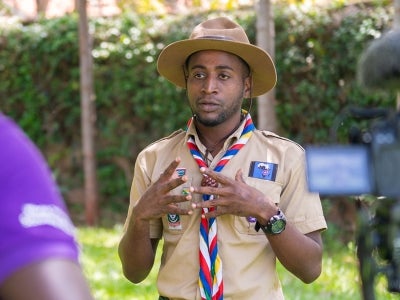
Photo courtesy of Sanidia Sambu
Sanidia Sambu, an agronomy student from Guinea-Bissau, will attend the 4th International Conference on Small Island Developing States with support from the Global Environment Facility. In an interview, she reflected on the connections between agriculture, forests, biodiversity, and pollution, and stressed the potential of youth entrepreneurship in efforts to build a more sustainable tomorrow.
What are you studying, and how does it relate to the environment?
I am studying agronomy at Amílcar Cabral University in Guinea-Bissau. I also do research work for Ianda Guinea Rice and Ianda Guinea Horta, which are European Union programs in Guinea-Bissau. My country’s economy is dominated by agriculture, which accounts for 60 percent of GDP and most of the employment in the country. However, rain-fed agriculture, hunting, forest burning, and the consumption of biomass, firewood, and charcoal also have serious environmental impacts. This includes loss of biodiversity, drought, erosion, and air pollution, with negative effects on the population's health. Farming can have significant effects on the environment – particularly pollution and degradation of soil, water, and air.
When did you become interested in environmental issues?
I became interested in climate issues once I learned about the increased forest exploitation and biodiversity losses in Guinea-Bissau. I learned that this increases pollution and deforestation - impacting the environment and exacerbating climate change and poverty.
Because of climate change, I’m affected by the reduction of water that’s available and the decrease in crop yields that we are seeing, along with forest fires and heat waves. Lately in the capital Bissau we are experiencing heatwaves that never occurred in the past – impacting our health, the economy, and society as whole.
What message do you have for today’s political or business leaders?
I would like them to focus on protecting the environment, leveraging sustainable policy solutions to promote sustainable economic growth and social justice, to invest in human capital and youth entrepreneurship to reduce joblessness, and assure prosperity for people.
Why is it important for you to be at SIDS-4?
For me it is very important to be at this conference because it will bring together leaders from different countries to discuss, share views, and build a global network of leaders to solve the climate crisis and other related issues. It will be an opportunity as well to learn and share my experience to inspire sustainable actions across SIDS.
How do you spend your free time?
In my free time I like to do research, read books, and write poems. I also work to repurpose plastic bags and I make backpacks, purses, candies, and computer cases to sell. One day I would like to have a company that helps reduce the amount of plastic bags being used.
